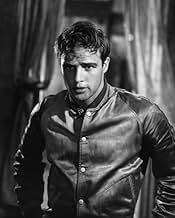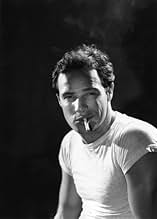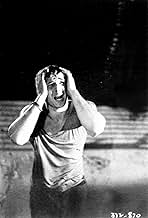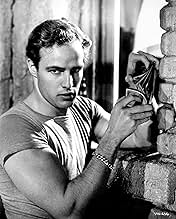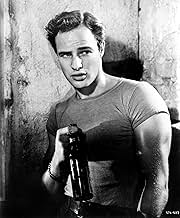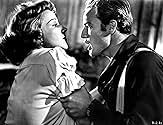Die verwirrte Blanche DuBois zieht in New Orleans bei ihrer Schwester ein und wird von ihrem brutalen Schwager traktiert, während die Realität um sie herum zerfällt.Die verwirrte Blanche DuBois zieht in New Orleans bei ihrer Schwester ein und wird von ihrem brutalen Schwager traktiert, während die Realität um sie herum zerfällt.Die verwirrte Blanche DuBois zieht in New Orleans bei ihrer Schwester ein und wird von ihrem brutalen Schwager traktiert, während die Realität um sie herum zerfällt.
- 4 Oscars gewonnen
- 22 Gewinne & 15 Nominierungen insgesamt
James Adamson
- Extra
- (Nicht genannt)
Irene Allen
- Extra
- (Nicht genannt)
Mel Archer
- Foreman
- (Nicht genannt)
Walter Bacon
- Club Patron
- (Nicht genannt)
Dahn Ben Amotz
- Minor Role
- (Nicht genannt)
Empfohlene Bewertungen
When the history of American theater is written for the 20th Century the two most prominent names will be Eugene O'Neill and Tennessee Williams. Both men pushed the exploration of the human soul to the very limit in their work. Writing drama will never be the same because of the work of these two men.
Williams's masterpiece is A Streetcar Named Desire which ran over 860 performances in three years. When Warner Brothers bought the film rights, they did the highly unusual thing of bringing almost the entire Broadway cast over. That included Marlon Brando for whom this was his second film. Brando was not a movie name yet and the decision was made to recast the female lead with Vivien Leigh instead of Jessica Tandy who played Blanche Dubois on Broadway.
In doing so this gave Vivien Leigh the very unique position of having played opposite the two men who are held up as male acting icons for the last century, Marlon Brando and Leigh's husband at the time Laurence Olivier. Certainly Blanche Dubois was unlike anything she ever did opposite Olivier.
In fact Blanche is opposite that other southern belle that Leigh got her first Oscar for, Scarlett O'Hara. Scarlett may come on like a spoiled brat at first, but she turns out to be made of some real stern stuff when the chips are down.
Blanche Dubois however retreats into her own fantasies when trouble brews. She's left the plantation home in a small Mississippi town where she doubles as an English teacher and comes to live with her sister Stella and her husband Stanley Kowalski.
Brando is Kowalski and for years impressionists did him by yelling from the pit of their abdomens, "STELLA, STELLA." That is until The Godfather and then they stuffed their cheeks and said how one day a favor would be asked in return.
But impressionists only make a living because of the impressions made by the players. On Broadway and Hollywood, Stanley Kowalski made Marlon Brando a superstar and an icon for a couple of generations. Kowalski as done by Brando is a force of nature, primeval impulses that bubble to the surface in all of us sometimes.
Kim Hunter as Stella Kowalski and Karl Malden as Mitch Mitchell also won Oscars in the Supporting categories to go with Leigh's. Hunter is a torn women fighting both suspicions about her husband and her sister. The real reason why Blanche has come to live with them and the affect her silly flirtations are having on her husband and their marriage.
Malden as Mitchell starts out as passive and as nice as Jim Connor, the gentleman caller from that other Tennessee Williams masterpiece, A Glass Menagerie. But he proves to be something less than meets the eye in his dealings with Leigh.
A Streetcar Named Desire won all kinds of Awards, the three acting Oscars, one for Elia Kazan as Best Director and a whole bunch of technical ones. But An American In Paris won for Best Picture and Hollywood decided young Brando could wait for his and they gave it that year to Humphrey Bogart for The African Queen.
This film is still the best adaption to the screen of a Tennessee Williams play and is an absolute must to see.
Williams's masterpiece is A Streetcar Named Desire which ran over 860 performances in three years. When Warner Brothers bought the film rights, they did the highly unusual thing of bringing almost the entire Broadway cast over. That included Marlon Brando for whom this was his second film. Brando was not a movie name yet and the decision was made to recast the female lead with Vivien Leigh instead of Jessica Tandy who played Blanche Dubois on Broadway.
In doing so this gave Vivien Leigh the very unique position of having played opposite the two men who are held up as male acting icons for the last century, Marlon Brando and Leigh's husband at the time Laurence Olivier. Certainly Blanche Dubois was unlike anything she ever did opposite Olivier.
In fact Blanche is opposite that other southern belle that Leigh got her first Oscar for, Scarlett O'Hara. Scarlett may come on like a spoiled brat at first, but she turns out to be made of some real stern stuff when the chips are down.
Blanche Dubois however retreats into her own fantasies when trouble brews. She's left the plantation home in a small Mississippi town where she doubles as an English teacher and comes to live with her sister Stella and her husband Stanley Kowalski.
Brando is Kowalski and for years impressionists did him by yelling from the pit of their abdomens, "STELLA, STELLA." That is until The Godfather and then they stuffed their cheeks and said how one day a favor would be asked in return.
But impressionists only make a living because of the impressions made by the players. On Broadway and Hollywood, Stanley Kowalski made Marlon Brando a superstar and an icon for a couple of generations. Kowalski as done by Brando is a force of nature, primeval impulses that bubble to the surface in all of us sometimes.
Kim Hunter as Stella Kowalski and Karl Malden as Mitch Mitchell also won Oscars in the Supporting categories to go with Leigh's. Hunter is a torn women fighting both suspicions about her husband and her sister. The real reason why Blanche has come to live with them and the affect her silly flirtations are having on her husband and their marriage.
Malden as Mitchell starts out as passive and as nice as Jim Connor, the gentleman caller from that other Tennessee Williams masterpiece, A Glass Menagerie. But he proves to be something less than meets the eye in his dealings with Leigh.
A Streetcar Named Desire won all kinds of Awards, the three acting Oscars, one for Elia Kazan as Best Director and a whole bunch of technical ones. But An American In Paris won for Best Picture and Hollywood decided young Brando could wait for his and they gave it that year to Humphrey Bogart for The African Queen.
This film is still the best adaption to the screen of a Tennessee Williams play and is an absolute must to see.
10Rathko
There is little to be said about this movie that thousands of critics have not stated already. It is a magnificent piece of cinema, with an intricate script delivered by actors at the peak of their talents. Leigh is unbearably brittle and fragile and she dances precariously on the edge of sanity. Marlon Brando embodies a sense of brooding masculinity that other men can only dream of attaining, while creating an enduring cinema icon and delivering one of the all-time great movie lines. From the raucous jazz score to the sleazy production design bathed in smoldering grey, 'Streetcar' is a class-act from beginning to end; sexy, brutal, and endlessly fascinating.
Blanche DuBois reminds me of Norma Desmond in Sunset Blvd. (1950). Both characters succumb to their alter egos, and descend into their own worlds of fantasy and half-truths.
In "A Streetcar Named Desire", Blanche travels from her antebellum roots in Mississippi to New Orleans, to see her sister Stella. But, upon arriving in the Big Easy, Blanche must confront Stella's husband Stanley, a greasy, poker-playing neanderthal lout who knows a thing or two about reality. It's the clash between Blanche's stately delusions and Stanley's gritty realism that soups up the drama in this Tennessee Williams play, converted to film classic by director Elia Kazan.
The drama is absorbing. But the performances of Marlon Brando and Vivien Leigh, as Stanley and Blanche, are what make the film the cinematic powerhouse that it is. Excellent B&W lighting and jazzy background music amplify the seedy, sleazy atmosphere, which adds depth and texture to the story and the acting. And, of course, the claustrophobic, steamy French Quarter makes a perfect setting.
As one would expect for a film derived from a play, "A Streetcar Named Desire" is very talky. Generally, I don't care for films burdened with a ten thousand page script. But this talk-fest is an exception. Overwhelming what I would otherwise consider a weakness, the acting of Brando and Leigh alone are enough to justify a two hour investment, and render an enjoyable and memorable cinematic experience.
In "A Streetcar Named Desire", Blanche travels from her antebellum roots in Mississippi to New Orleans, to see her sister Stella. But, upon arriving in the Big Easy, Blanche must confront Stella's husband Stanley, a greasy, poker-playing neanderthal lout who knows a thing or two about reality. It's the clash between Blanche's stately delusions and Stanley's gritty realism that soups up the drama in this Tennessee Williams play, converted to film classic by director Elia Kazan.
The drama is absorbing. But the performances of Marlon Brando and Vivien Leigh, as Stanley and Blanche, are what make the film the cinematic powerhouse that it is. Excellent B&W lighting and jazzy background music amplify the seedy, sleazy atmosphere, which adds depth and texture to the story and the acting. And, of course, the claustrophobic, steamy French Quarter makes a perfect setting.
As one would expect for a film derived from a play, "A Streetcar Named Desire" is very talky. Generally, I don't care for films burdened with a ten thousand page script. But this talk-fest is an exception. Overwhelming what I would otherwise consider a weakness, the acting of Brando and Leigh alone are enough to justify a two hour investment, and render an enjoyable and memorable cinematic experience.
Tennessee Williams himself wrote of Vivien Leigh"s performance in "Streetcar Named Desire": "She brought everything I intended to the role and even much more than I had dared dream of".
Brando is wonderful as Stanley Kowalski, but the new viewers to the film seem to come away with the haunting greatness of Vivien Leigh in what is one of the most harrowing and shattering pieces of acting ever committed to film.
Although some have expressed regret that Jessica Tandy did not repeat her stage performance, it is probably good to note that her husband Hume Cronyn and Elia Kazan (the director of the film and play) both never felt that Tandy quite got the character right. If you listen to the radio performance of extracted scenes that Tandy gave on the occasion of the Pulitzer Prize award, it will reenforce the perfection of Leigh's inflections and innate understanding of the role. This inner and complete understanding is what Brando praises Leigh for in his autobiography. He agrees that she plays this Hamlet of female roles better than anyone because he felt she was quite like the character...sadly.
If anyone is interested in great acting check out "Streetcar" for Vivien Leigh's Academy Award winning performance. The supporting cast is outstanding from Kim Hunter and Karl Malden (both Oscar winners for the film)to, of course, the iconographic T-shirt-torn Brando.
Brando is wonderful as Stanley Kowalski, but the new viewers to the film seem to come away with the haunting greatness of Vivien Leigh in what is one of the most harrowing and shattering pieces of acting ever committed to film.
Although some have expressed regret that Jessica Tandy did not repeat her stage performance, it is probably good to note that her husband Hume Cronyn and Elia Kazan (the director of the film and play) both never felt that Tandy quite got the character right. If you listen to the radio performance of extracted scenes that Tandy gave on the occasion of the Pulitzer Prize award, it will reenforce the perfection of Leigh's inflections and innate understanding of the role. This inner and complete understanding is what Brando praises Leigh for in his autobiography. He agrees that she plays this Hamlet of female roles better than anyone because he felt she was quite like the character...sadly.
If anyone is interested in great acting check out "Streetcar" for Vivien Leigh's Academy Award winning performance. The supporting cast is outstanding from Kim Hunter and Karl Malden (both Oscar winners for the film)to, of course, the iconographic T-shirt-torn Brando.
"Streetcar Named Desire" is an exceptional film, thanks to three essential components: (1) the superb acting ability of its two leads, Vivien Leigh and Marlon Brando, as well as that of the supporting cast, small in number but huge in its combined dramatic power, (2) an excellent screenplay by the original playwright, Tennessee Williams, that is packed from beginning to end with explosive, conflict driven dialogue, and (3) the brilliant direction of Elia Kazan who so skillfully brings the play to the screen.
In its legendary opening, Blanche DuBois (Vivien Leigh) emerges from a cloud of locomotive smoke and is helped onto a streetcar by a perfect stranger, a sailor. This simple act neatly ties the film's beginning to Blanche's final, heartbreaking line, "I have always depended upon the kindness of strangers". She, as the central character, is lost in the big city, and she becomes more and more hopelessly adrift in the world as the film approaches its very tragic end.
Broke and friendless, Blanche lands in New Orleans where her sister, Stella (Kim Hunter) lives with her coarse, crude husband, Stanley Kowalski (Brando). Having lost her ancestral home on account of family-related debt and having been dismissed under vague circumstances from her position as a high school English teacher in the small Mississippi town from where she came, she has no other place to go at a time of dire need.
Although Stella is genuinely concerned about Blanche's declining physical and mental state, the shabby apartment where she lives with Stanley consists of two small rooms, barely enough space for the Kowalskis even without Stanley's regular poker group, which seems to park itself there at every available opportunity. What makes matters worse is Stanley's loud and boisterous personality. From the start, Stanley resents the presence of Blanche, which he views as an unwanted, disruptive invasion of his marriage and his home. He regards her with total distrust and disdain. Another reviewer here interpreted this as a cultural clash between the old and the new South, and I think that is a very astute observation. In any case, Stanley is totally unsympathetic to Blanche's plight and looks upon her with nothing but suspicion and contempt.
Blanche is trapped in the claustrophobic and confining prison of the dingy Kowalski apartment. For one, fleeting moment, she believes that Mitch (Karl Malden), Stanley's poker buddy and co-worker, stands as her one bright hope of liberation from the walls that continue to close around her, but he turns out to be anything but her desperately needed "knight in shining armor". Tragically, Mitch, a weak individual who is still dominated by a strong mother well into his adulthood, is the last person with the ability to give Blanche the love and strength that she so urgently needs and to whisk her away from the stifling, debilitating atmosphere of the Kowalski dungeon. Blanche's one, last hope for personal redemption soon fades away forever.
I read that, under different circumstances, the lead roles could have been awarded to Olivia de Haviland and John Garfield. As much as I like them both, this would have been a much different movie with them as the leads. Ms. Leigh, a stunning Englishwoman who managed to score two Oscars for playing two iconic, southern American characters, portrays a mentally declining Blanche with great depth and compassion. As to Mr. Brando's brutish and obnoxious Stanley, you've got to see him in action to appreciate his magnificent performance. As in the case of his Terry Malloy in "On the Waterfront", I don't believe that Stanley's most famous lines from this film would be among the most imitated to this day if they weren't delivered so dynamically by Brando in the first place. "Hey, Stel-la!" Sorry. I just couldn't help myself.
While Brando was beaten out of the Oscar by Humphrey Bogart in "African Queen" (not my favorite Bogey movie by a long shot), Leigh, Malden, and Hunter swept the awards for their performances here and deservedly so. The memorable role of feisty neighbor Eunice also launched Pat Hillias's successful career throughout the golden age of television during the 1950's until her tragic and untimely death in 1960.
If you want to watch an unforgettable rendering of a strong, intense script that is worthy of such a talented cast and director, don't miss this one.
In its legendary opening, Blanche DuBois (Vivien Leigh) emerges from a cloud of locomotive smoke and is helped onto a streetcar by a perfect stranger, a sailor. This simple act neatly ties the film's beginning to Blanche's final, heartbreaking line, "I have always depended upon the kindness of strangers". She, as the central character, is lost in the big city, and she becomes more and more hopelessly adrift in the world as the film approaches its very tragic end.
Broke and friendless, Blanche lands in New Orleans where her sister, Stella (Kim Hunter) lives with her coarse, crude husband, Stanley Kowalski (Brando). Having lost her ancestral home on account of family-related debt and having been dismissed under vague circumstances from her position as a high school English teacher in the small Mississippi town from where she came, she has no other place to go at a time of dire need.
Although Stella is genuinely concerned about Blanche's declining physical and mental state, the shabby apartment where she lives with Stanley consists of two small rooms, barely enough space for the Kowalskis even without Stanley's regular poker group, which seems to park itself there at every available opportunity. What makes matters worse is Stanley's loud and boisterous personality. From the start, Stanley resents the presence of Blanche, which he views as an unwanted, disruptive invasion of his marriage and his home. He regards her with total distrust and disdain. Another reviewer here interpreted this as a cultural clash between the old and the new South, and I think that is a very astute observation. In any case, Stanley is totally unsympathetic to Blanche's plight and looks upon her with nothing but suspicion and contempt.
Blanche is trapped in the claustrophobic and confining prison of the dingy Kowalski apartment. For one, fleeting moment, she believes that Mitch (Karl Malden), Stanley's poker buddy and co-worker, stands as her one bright hope of liberation from the walls that continue to close around her, but he turns out to be anything but her desperately needed "knight in shining armor". Tragically, Mitch, a weak individual who is still dominated by a strong mother well into his adulthood, is the last person with the ability to give Blanche the love and strength that she so urgently needs and to whisk her away from the stifling, debilitating atmosphere of the Kowalski dungeon. Blanche's one, last hope for personal redemption soon fades away forever.
I read that, under different circumstances, the lead roles could have been awarded to Olivia de Haviland and John Garfield. As much as I like them both, this would have been a much different movie with them as the leads. Ms. Leigh, a stunning Englishwoman who managed to score two Oscars for playing two iconic, southern American characters, portrays a mentally declining Blanche with great depth and compassion. As to Mr. Brando's brutish and obnoxious Stanley, you've got to see him in action to appreciate his magnificent performance. As in the case of his Terry Malloy in "On the Waterfront", I don't believe that Stanley's most famous lines from this film would be among the most imitated to this day if they weren't delivered so dynamically by Brando in the first place. "Hey, Stel-la!" Sorry. I just couldn't help myself.
While Brando was beaten out of the Oscar by Humphrey Bogart in "African Queen" (not my favorite Bogey movie by a long shot), Leigh, Malden, and Hunter swept the awards for their performances here and deservedly so. The memorable role of feisty neighbor Eunice also launched Pat Hillias's successful career throughout the golden age of television during the 1950's until her tragic and untimely death in 1960.
If you want to watch an unforgettable rendering of a strong, intense script that is worthy of such a talented cast and director, don't miss this one.
Wusstest du schon
- WissenswertesAs the film progresses, the set of the Kowalski apartment actually gets smaller to heighten the suggestion of Blanche's increasing claustrophobia.
- PatzerWhen Stanley comes back from taking Stella to the hospital, he is looking for a bottle opener. He finds it on the mantelpiece, shakes up a bottle of beer, and opens it. The beer foams up and spills on his trousers. But if you watch at the moment when he swings himself up to sit on the table - before he opens the bottle - you can see that the front of his trousers are already wet. Apparently they re-shot it without him changing into dry trousers.
- Alternative VersionenThe scene in which Blanche and Stanley first meet was edited a bit to take out some of the sexual tension that both had towards each other when the film was first released in 1951. In 1993, this footage was restored in the "Original Director's Version" of the film. The three minutes of newly-added footage sticks out from the rest of the film because Warner Brothers did not bother to restore these extra film elements along with the rest of the movie, leaving them very scratchy due to deterioration.
- VerbindungenEdited into Elia Kazan, vom Outsider zum Oscarpreisträger (2018)
- SoundtracksIt's Only a Paper Moon
(1933) (uncredited)
Music by Harold Arlen
Lyrics by E.Y. Harburg and Billy Rose
Sung by Vivien Leigh while doing her hair
Top-Auswahl
Melde dich zum Bewerten an und greife auf die Watchlist für personalisierte Empfehlungen zu.
Details
- Erscheinungsdatum
- Herkunftsland
- Sprachen
- Auch bekannt als
- Un tranvía llamado Deseo
- Drehorte
- New Orleans, Louisiana, USA(railway station)
- Produktionsfirmen
- Weitere beteiligte Unternehmen bei IMDbPro anzeigen
Box Office
- Budget
- 1.800.000 $ (geschätzt)
- Weltweiter Bruttoertrag
- 54.695 $
- Laufzeit2 Stunden 2 Minuten
- Farbe
- Seitenverhältnis
- 1.37 : 1
Zu dieser Seite beitragen
Bearbeitung vorschlagen oder fehlenden Inhalt hinzufügen

Oberste Lücke
What was the official certification given to Endstation Sehnsucht (1951) in Japan?
Antwort






